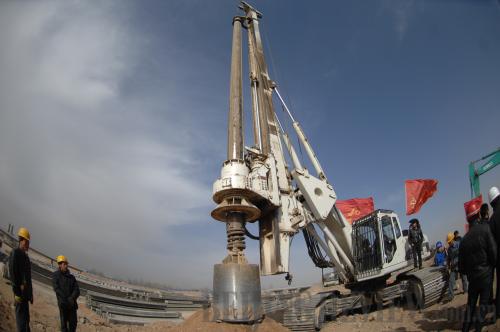|
|

|
|
BRIDGING NORTH CHINA: Workers waste no time on construction of national highway No. 211 linking Yinchuan, capital of Ningxia Hui Autonomous Region and Xi'an, capital of Shaanxi Province (PENG ZHAOZHI) |
This year, China's macroeconomy will face several particular questions: What will China do to restructure its economy and transform its growth model? Will the ongoing recovery be as bumpy as last year? Will soaring housing prices be successfully checked? Will the inflation rate become lower in the second half than the first as expected? How will the country develop its emerging industries? Economic Information Daily has selected 10 issues it believes will affect China's macroeconomy this year. Edited excerpts follow:
Monetary policy
China's central bank has set the growth rate target for M2 (broad money supply) at 16 percent for 2011. CPI (consumer price index) growth is a key factor that will affect the monetary policy.
It's estimated the impact of price hikes at the end of last year will be more significant in the first half than the second half, CPI could easily exceed 5 percent during the first few months of the year. Since the CPI growth target will be set at 4 percent this year, policy adjustment is needed to prevent higher food prices from causing widespread inflation.
Markets are betting the first quarter could witness concentrated policy adjustments, with the reserve requirement ratio, interest rate and exchange rate all increasing in the first half. The interest rate may be increased three times this year, twice in the first half, and once in the second half; the reserve requirement ratio may be increased to 20 percent; and the yuan may appreciate by 5 percent. The new-loan target might be set at 7 trillion yuan ($1.06 trillion).
Ba Shusong, Deputy Director of the Research Institute of Finance at the Development Research Center of the State Council, forecast the Chinese economy will achieve a growth rate of 9-10 percent this year and CPI will be the major basis on which the central bank will set its new-loan target.
In the first half, especially in the first quarter, China's monetary policy will focus on effective management of excessive liquidity through differentiated reserve requirement ratios and other regular monetary instruments.
Housing market
This January witnessed the stiffest property market regulation yet released by the State Council as well as the implementation of pilot property tax programs in Shanghai and Chongqing.
The new measures, including a 10-percent hike in the minimum down payment required on a second home and limits on home purchasing, will dampen housing demand, said Gao Shan, Vice General Manager of Beijing-based Yahao Real Estate Selling and Consulting Solutions Agency. With the implementation of these measures, transactions in housing market will decrease dramatically and the land market will remain tepid, said Gao.
The launch of the property tax and the latest measures targeting the housing market will reduce inflationary expectations related to the housing market, said Zhang Dawei, an analyst with Beijing Centraline Property Co. Ltd. Housing prices in some big cities including Beijing may cease to rise, prices in suburban areas may even decrease, and 60 percent of potential home buyers will choose to wait and see, said Zhang.
The new round of housing market regulation will usher in a nationwide cooling of the housing market, said Yang Hongxu, an analyst with Shanghai-based E-house China Research and Development Institute. Tightening monetary policy, increasing housing supply and the tough credit environment for developers will all contribute to housing price decreases, Yang said. He estimated housing prices in 70 major cities will see year-on-year declines in the second quarter.
Consumer prices
CPI, the main gauge of inflation, rose 3.3 percent in 2010, higher than the safety line of 3 percent set at the outset of last year. This year, the country still faces inflationary pressure.
But experts say what is more important is we should have more accurate measurements for the CPI. What should be noted is that it is determined by the price change of each product in the CPI basket and also the weight of each product in the CPI basket. For a long time, food had a weighting of 32-33 percent in the CPI basket, but the weight of housing-related costs in the CPI didn't fully reflect the cost changes despite the soaring housing prices in recent years.
China will adopt a new CPI weighting system this year, said National Bureau of Statistics spokesman Sheng Laiyun. It is reported housing-related, medical and health care, entertainment and education costs will be weighted more heavily in the CPI basket while the weighting for food will be decreased.
Rise of the yuan
China has already taken steps to encourage cross-border trade using the yuan, beginning with a pilot program in 2009 allowing yuan settlements in trade between five Chinese cities and Hong Kong, Macao and some Southeast Asian nations. The program has since been expanded to all foreign trade partners and 20 Chinese provinces.
HSBC forecasts at least half of China's trade with emerging economies will be settled in the yuan within the next three to five years, compared with 3 percent currently. That means nearly $2 trillion worth of cross-border trade will be settled in the yuan, making the yuan one of the three major currencies used in global trade, said a HSBC report.
Meanwhile, an offshore market for the yuan has been growing in Hong Kong. As of the end of 2010, yuan deposits in Hong Kong reached 314.9 billion yuan ($47.9 billion). The Chinese Central Government and various enterprises are entitled to issue yuan-dominated bonds for overseas investors. As of December 20, 2010, more than 20 billion yuan ($3 billion) worth of bonds had been issued for the year in Hong Kong.
| 